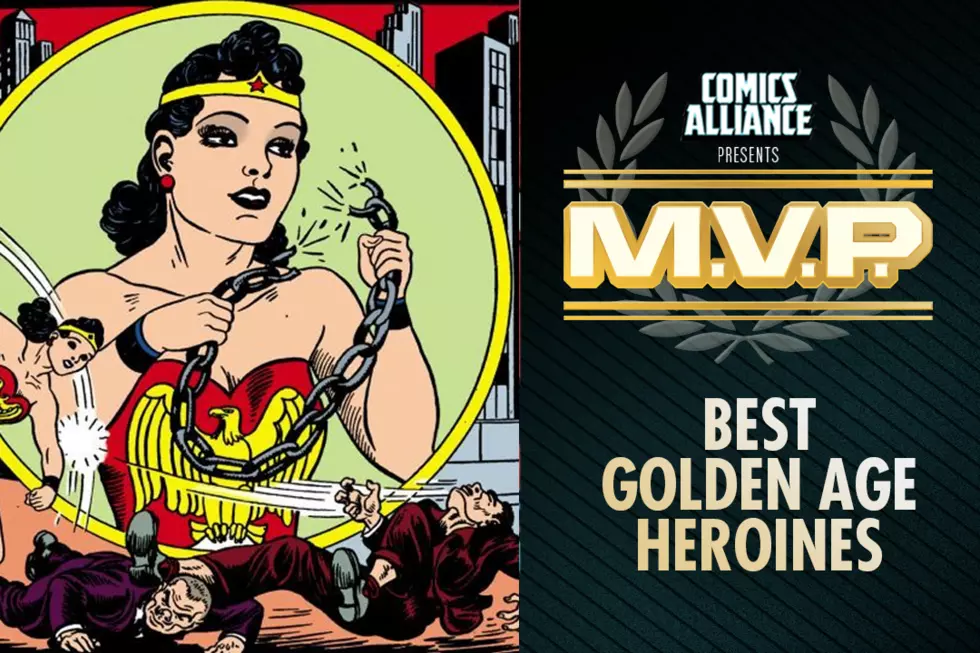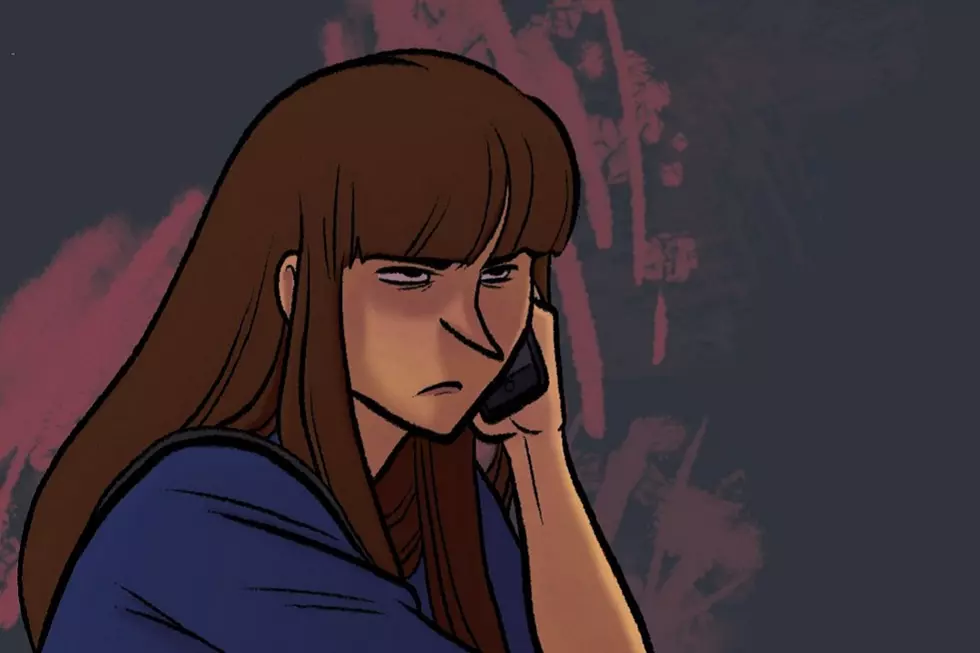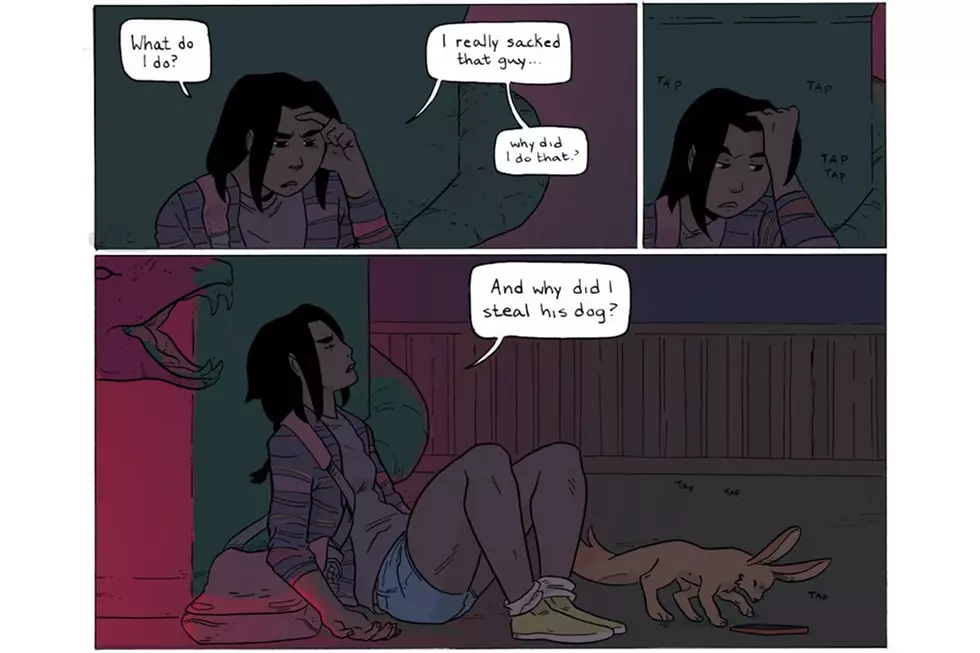
Liz Prince Talks ‘Tomboy’, Internet Fame And The State Of Autobio Comics
In her new memoir Tomboy, Liz Prince explores the thorny world of gender expression, puberty, and girlhood, as experienced by someone who bucked every norm of it. It’s not always an easy read, but it is one of the most necessary comics published this year.
Prince’s work is tender, wry, and above all, honest. It is this honesty that so illuminates her work, from the single travails of Alone Forever to her chronicles of the punk scene. As Tomboy makes the rounds of Best of 2014 lists, ComicsAlliance spoke with her about autobiography, Internet fame, and being “not like other girls.”
ComicsAlliance: You've been doing autobiographical work for a while. How has your approach changed? What was it like creating something like Tomboy as opposed to Alone Forever or Will You Still Love Me If I Wet The Bed?
Liz Prince: It's really weird, in hindsight, to be known primarily for WYSLM, because it was a book I drew using a style that was "experimental" to me at the time. The comics in that book were actually drawn as quick sketches for comics that I wanted to come back to and actually take my time drawing at some point, but the people who saw them in my sketchbook thought that the loose, immediate, imperfect drawing style really reflected the idea of them being moments in a relationship. All of my Top Shelf Books are collections of really short strips, so writing Tomboy, which is a memoir about my childhood with the theme of gender stereotypes, was really daunting at first. Once I started thinking of it as shorter vignettes connected with a larger theme, it got easier to write.
CA: What do think is the "state" of autobio comics today? It has very DIY roots, but with creators like Lucy Knisley, Alison Bechdel and yourself growing in prominence, it feels like a whole different ballgame than even a few years ago.
LP: I actually think that there have been ebbs and flows as far as autobio comics, and their visibility is concerned. In the early 2000s there was Craig Thompson's Blankets, and American Elf by James Kolchalka was very popular. Jeffrey Brown became astronomically popular because of Clumsy and Unlikely. Incidentally all of those books are Top Shelf, and that's why I felt like my work fit with them. Then it seemed like there weren't that many autobio comics being published, although there were a lot of diary comics online. I think the focus now is on "graphic memoirs", and it's really great to see that women cartoonists have been leading the charge; some of my favorite books in the genre are Calling Dr. Laura by Nicole Georges, Smile by Raina Telgemeier, and Tangles by Sarah Leavitt.
CA: So many aspiring creators go to the Internet before they go anywhere else now -- brilliant new faces pop up on Tumblr or Twitter before anywhere else. Back in the days of Livejournal, and even earlier, you were blazing that trail. How do you feel about the Internet's place in comics' ecosystem?
LP: Oh, wow, I guess I had never thought of myself as a trailblazer, as far as posting comics online is concerned, but yeah, it is true that I was doing it as early as 1999, on a website called The Art Conspiracy that was kind of like a social media site for artists. I guess deviantART is pretty similar, although I've never used deviantART. I like the Internet as place to get instant gratification: posting a comic online is the quickest way to get attention for your art, but I have been talking to a lot of younger, aspiring cartoonists who very quickly get discouraged if they aren't getting a lot of attention immediately. This can also be aggravated by artists who appear to be really quickly Tumblr-famous, and get lots of notes on their work. I think it gives too much for a young artist to compare themselves too. I'm not sure that "notes" or "likes" are what we should be aspiring to, but the Internet means something different to me because I've always been primarily interested in publishing physical books.
CA: Tomboy is a longform narrative comic, something you haven't done before. What was that creation process like, as opposed to your other work?
LP: My other work was very largely based around that "instant gratification" thing I was just talking about; quick comics that I could post online and get out there. Writing an entire 250-page book, and not being able to show many people what I was working on while I was doing it, was really different from the way that I normally operate. Having the theme of gender was really helpful to tailor the anecdotes I told to that theme kept me from being too "rambly". There were a lot of stories from my childhood that would have been fun to tell, but when it came down to it, they didn't move the story forward, so they didn't make it into the book. I've never had to think about audience or cohesive narrative before, but it wasn't too hard to adapt my writing style. What I really think it came down to is that all those comics I'd drawn before where preparation for this big book, which is a story I've been wanting to tell for a long time (but didn't have an outlet for).
CA: Your style reminds me of doodles -- in the best way. It's immediate, honest, and clean. How did you develop it?
LP: I've always been a draw-er, all throughout elementary school I was the "kid who draws". I was really into drawing Disney characters, and sometimes kids would "commission" me to draw Donald Duck or the Genie from Aladdin for them, on their binders or whatever. I started creating my own characters and storylines, that were mostly anthropomorphic animals doing rip-off Disney stuff. In high school I got really into Evan Dorkin comics, and I drew a series called Scott the Angry Paper Cup, which was a very weak Milk & Cheese plagiarism.
But after I discovered Ariel Schrag's autobio comics, I started drawing about myself very seriously, and that was the beginning of me discovering my own style. Of course it evolves and changes and hopefully gets tighter as I keep drawing, but it's the culmination of trying on lots of different hats over the years.
CA: Tomboy is among the first published comics I've seen deal head-on with issues like internalized misogyny. We're at a cultural moment now where many women are realizing, suddenly, that this was within them all along. What got you thinking about gender? What sort of audience response have you gotten regarding these issues?
LP: I've always thought about gender, as someone who has been categorically "gender nonconforming" for my entire life, I was forced to think about it, but obviously I became more conscious of it as a social issue as I've gotten older. And as I've met more folks who are genderqueer or trans, it's been really enlightening to hear their stories, and it got me thinking about my own gender history. An unexpected side effect of writing Tomboy is that I have gotten a lot of letters and emails from parents of tomboys, who say that they read the book, and they feel like they understand their children so much better now. I got a really emotional letter from a woman who has a tomboy daughter, who she has in the past tried to force to conform more strictly to a gender norm, and my book made her feel really terrible for doing that, because she understands now that her daughter should be free to express herself the way that is comfortable to her. I was really unprepared for receiving feedback like that; letters about how my book has actually changed the way someone approaches their parenting. It's very validating.
CA: The back half of Tomboy goes into your friend Maggie, zines, and the punk scene's positive influence on you. I know that, personally, influences like that are what allowed me to explore things that made me uncomfortable as a girl. What can we do, as members of the comics community, to make sure everyone feels welcome?
LP: I have been thinking about that issue a lot lately, about the comics community, and sexism therein. I have to admit that I have been either largely blind to it, because I exist in the zine/small press community, which has always felt more even keel to me, when it comes to creators of varied gender backgrounds. But I also think that there is something to be said about the fact that even though I am female, I present closer to male in my way of dress and attitude/confidence/outspokeness, so I am treated differently by my male counterparts in a positive way. What I'm trying to say is, I'm currently personally investigating the idea that I may exist with some modicum of male privilege in the comics community even though I am female, but it's just a theory right now. I used to think that a guy telling me I'm "not like other girls" was a compliment and I've now flipped to seeing that for the back-handed compliment that it is.
I don't know what the comics community could do to make everyone feel welcome; I'm cynical and unsure if everyone can feel welcome, simply because so many people have conflicting ideas of what is welcoming, but I think that calling out creators and comic industry people who have harassed people and/or been abusive is a good first step. If we create a culture where those kinds of actions can no-longer go unchecked, then more people may feel welcome to participate and know that they will be heard if they experience unfairness.
CA: Tomboy most impressed me in its details. There are so many things that rang true of childhood, like "the kid who likes to draw Genie from Aladdin" (I was "the kid who liked to draw Jigglypuff from Pokémon.") What is it like having to translate long-ago memories in contemporary work? What makes a portrayal of childhood feel honest, when so many end up saccharine?
LP: I was really worried that since all of my pop culture references in Tomboy are from the '80s, and this is a book that is being marketed towards teens of the 2010s, the book would fall flat for a lot them. It helped me to realize that kids can connect with the idea of just being a fan of something, even if it isn't the thing they know and love. Or even if they don't connect with that, it's been really fun to talk to people who are my age who really loved those references in my book (I have never had so many conversations with adults about Popples). Unfortunately I think that one of the things that made the childhood portrayed in Tomboy feel honest is because it has an edge of cruelty to it, because childhood is, for a lot of people, a pretty cruel time. I waffled back and forth about whether or not to leave in so many swear words, and there was some discussion about the smoking and drug references in the book being "too adult", but those things were really true to my childhood, and to a lot of other people's childhoods too. Julia Wertz congratulated me on the authenticity of the language I used, she liked that my 4th grade self called a 6th grader on the bus a "Frankendork", which, to the best of my knowledge, is what I genuinely called him, and I really thought I was being clever at the time!
CA: What sort of legacy to you hope to leave as a creator?
LP: I want to be someone who is known for portraying themselves honestly. I try to avoid aggrandizing things I've done. I was really inspired by seeing self published zines and mini-comics: seeing someone else make work that was either really personal, or was just done entirely themselves. It really showed me what was possible for my own art, and I hope that my books will inspire readers in the same way. I want to be the person who's art is accessible, who someone could look at and say "That's doesn't look so hard, I could do that."
CA: Finally, I feel like I can't interview Liz Prince and not ask this, so here goes: whatcha been listening to lately?
LP: Well, like everyone else I've encountered, I'm pretty into the Serial podcast, and I have to admit that I've been watching Gilmore Girls in the background while I work (and I'm still not sure if I actually like it, or if it's just easy to follow without having to pay attention). Music wise, I've been alternating between Chumped's new album Teenage Retirement and Caves' new album Leaving. Apparently my musical choices of the moment were brought to you by the letter "C".
Tomboy: A Graphic Memoir is on sale now from Zest Books.
More From ComicsAlliance
![When Everything Is Pink, Nothing Is Pink: Sarah Stern On Color And Creativity [Interview]](http://townsquare.media/site/622/files/2017/03/Cindersong-feat.jpg?w=980&q=75)








